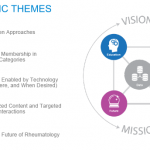
A goal without a plan is just a wish.
—Antoine de Saint-Exupery, French writer
The ACR has a long history of strategic planning. At its inception, a strategic plan was created to set goals for the organization. This plan has been modified over the years as the ACR has grown and changed, but the basic principles remain the same. In recent years, the ACR’s strategic plan has been used as a road map for guiding the work of ACR committees and ensuring that the organization continues to support its mission to advance the rheumatology subspecialty through programs of education, research, advocacy, and practice support. The ACR monitors progress on the strategic plan annually; however, every few years we take a look at the external environment and makes the necessary revisions to the plan in order to adjust strategies to coincide with changes to the environment that will have an affect on the rheumatology landscape.
On February 21, 2007, prior to the ACR Board of Directors meeting, the board, standing committee chairs, and several invited guests met to review critical issues and strategies in the current strategic plan and revise those strategies to most effectively address the needs of members over the next two years. This planning session had two prevailing themes: develop strategies to maximize the ACR’s value for its members and find ways to effectively communicate the ACR’s many initiatives to its members.
Volunteer Your Thoughts and Your Time
The College exists primarily for the benefit of its rheumatologist and allied rheumatic health professional members, so the main focus of the strategic planning session was to define and focus on how we can add the most value to ACR membership. Be on the lookout later this year for a membership survey soliciting feedback on what ACR programs and services you value and what additional benefits you would like the ACR to provide. Please take the time to complete the survey when you receive the questionnaire. The best way for you to ensure that the College is growing and expanding into areas that you value is to tell us about your wants, needs, and concerns.
Strategic planning session participants emphasized the need for members to be involved in the organization. The ACR is always looking for new volunteers. The number of committees and subcommittees has grown, and there are many new ways to get involved. Notable new opportunities this year include a Drug Safety Subcommittee and a Political Action Committee. Volunteering for the ACR benefits the organization, but it also provides you with unique networking opportunities and allows you to make a positive impact on the rheumatology subspecialty. This month, “From the College” talks with Mary K. Crow, MD, chair of the Committee on Nominations and Appointments, about applying for a volunteer position. (See “Call for Volunteers,”) Because there are often more volunteers than poisitions, you may not be selected for a committee in a given year, but you will be considered the next year. You can also contact Dr. Crow or the chair of the committee on which you would like to serve about opportunities to serve in an ad hoc function or on a subcommittee.
The best way for you to ensure that the College is growing and expanding into areas that you value is to tell us about your wants, needs, and concerns.
Commitment to Communication
Another important discussion during the strategic planning session was how to improve communications to members about the ACR’s many initiatives. The ACR’s initiatives focus on many areas that are pertinent to rheumatologists. Through the work of its committees, the ACR engages in continuous dialogue with the government and insurers on behalf of the rheumatology community, promotes educational and research opportunities for rheumatologists, and develops strategies to ensure the sustainability of the rheumatology workforce. The College’s leadership is committed to keeping members involved in the ACR’s efforts and communication is a vital component of that effort.

